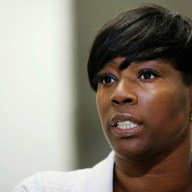 Toshiro Mifune is even better than usual in “The Hidden Fortress.”
Toshiro Mifune is even better than usual in “The Hidden Fortress.”
Credit: The Criterion Collection
‘The Hidden Fortress’
The Criterion Collection
$39.95
For a long time Akira Kurosawa’s “The Hidden Fortress” has been known as the primary film that George Lucas stole from to create “Star Wars.” (Sorry: “A New Hope.”) Indeed, it features two bickering peasants (read: droids) who get caught up in a land tussle. They happen upon a feisty princess (newcomer Misa Uehara) and a displaced general in hiding (Toshiro Mifune). But in the new edition of the 1958 samurai adventure, Lucas admits he really only borrowed the idea of starting with the lowliest characters (i.e. the peasants). There is no Luke, no Han Solo, not even Chewbacca. The closest to a Darth Vader is a polite general. And the princess isn’t captured till the end. Most of the similarities, Lucas confesses, are coincidences.
But any reason, even a series of exaggerations, is good enough to get people parked in front of “The Hidden Fortress,” which isn’t one of Kurosawa’s greatest but is the purest entertainment on his CV. The director is synonymous with the samurai film, but he made more dramas than adventures. And his adventures, including “Seven Samurai,” tended to be weighed down with purpose. There is no message in “The Hidden Fortress,” which concerns a defeated clan trying to rebuild by smuggling across enemy lines gold hidden in wood. (Just like “Star Wars”!) But it’s quietly, modestly profound. When our heroes appear to be doomed, rather than despair the princess — who has had to pose as a commoner in order to survive — remarks that she’s glad she got to see the good and the bad in humanity, to see “people without pretense.”
“The Hidden Fortress” is a straight-up genre film, made by someone who, by then, had become an expert. But it’s no mere vacation. It was Kurosawa’s first film in TohoScope, the Japanese equivalent of the super-widescreen Cinemascope. Kurosawa was young enough to throw himself at the chance to create images double the width of the box-shaped “Academy ratio” that would soon die out. His frames envelope the viewer in dry landscapes, from the rocky hills that hide the titular fortress to the plains, where the characters gallop around on horses, much like the films of one of Kurosawa’s heroes, John Ford.
Kurosawa even had his own John Wayne: Mifune. He’s somehow even more intimidating here than he is in other Kurosawas. But note the humanity he subtly conveys. His job is to protect the princess, which makes him humble. He’s even furtively funny, in the way he messes with the peasant protagonists — not like a bully, though he’s often called that, but in a way that connotes secret warmth. If he really hated you, he’d kill you. It’s one of Mifune’s best performances, hidden away in a film that only becomes deeper once you think to give it a closer look.
Also out
‘American Hustle’ Once-maligned director David O. Russell’s third hit in a row didn’t win a single one of the many Oscars it was nominated for last year. Maybe that’s for the best: The lack of trophies means we can view it like its characters as an eccentric loser trying to look swankier than it really is. But Amy Adams definitely deserved her nomination.
‘Mysterious Skin’ Gregg Araki’s keyed-up, candy-colored 2004 drama about sexual abuse wasn’t the first film with a great Joseph Gordon-Levitt performance. (He’s also terrific in 2001’s “Manic.”) But it was the film that officially made him more than that kid from “Third Rock from the Sun” (and “Angels in the Outfield”).
‘Frozen’ We’re not pointing fingers, but despite making more than $1 billion globally, there’s one critic who still hasn’t seen Disney’s latest behemoth. (Hint: It’s this moi.)
‘The Hunchback of Notre Dame’ Victor Hugo’s other repeatedly filmed novel (after “Les Miserables”) got no less than Lon Chaney as Quasimodo in this 1923 version.
















